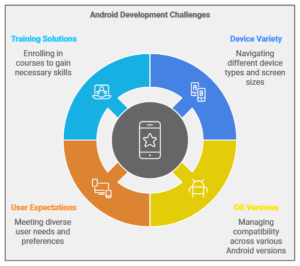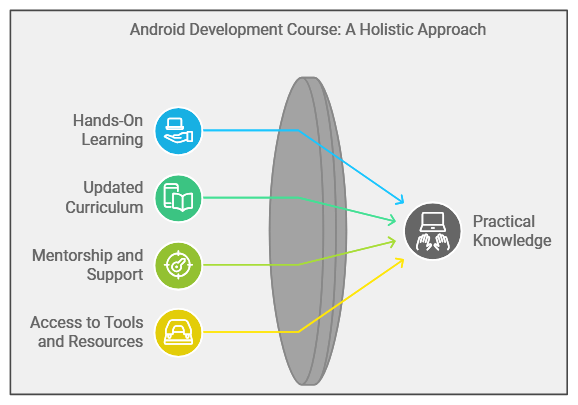In today’s digital-driven world, mobile applications have become crucial for businesses and individuals alike. However, developing an app can be a complex journey with numerous challenges along the way. From conceptualization to user experience, Android app development demands a specific set of skills, troubleshooting capabilities, and technical know-how. This is where an Android Development Course by institutions like Elysium Academy becomes invaluable, helping aspiring developers overcome common app development challenges effectively.
This blog delves into the common obstacles in Android app development and how a dedicated Android Development Course can equip learners with the skills and knowledge needed to tackle these hurdles confidently.
Understanding Android App Development Challenges
Android stands as one of the most widely adopted mobile operating systems globally, powering an estimated 2.5 billion devices across various form factors and manufacturers. Its open-source nature and adaptability have driven its popularity, but they also introduce unique challenges for developers. Android app development is complex, requiring developers to navigate a multitude of device types, screen sizes, operating system versions, and varying user expectations. These factors bring both exciting opportunities and unique development obstacles.
Successfully overcoming these challenges demands specific knowledge, a deep understanding of Android’s architecture, and well-rounded problem-solving skills. Aspiring developers can gain this through a well-structured Android Development Course that prepares them to address the most common hurdles. Below, let’s dive deeper into why these challenges exist and how targeted training can help developers effectively handle them.

Platform Fragmentation
Platform fragmentation is a hallmark of Android development due to the sheer diversity of devices that run on this operating system. Android’s open-source framework allows various manufacturers like Samsung, LG, Xiaomi, and others to create unique versions of Android to suit their hardware. This flexibility, while beneficial in creating a range of affordable and diverse devices, results in inconsistencies. Developers must account for different hardware specifications, screen sizes, processor speeds, and unique user interface modifications in their applications.
A comprehensive Android Development Course addresses these fragmentation issues by teaching developers how to:
- Design adaptive layouts that respond dynamically to different screen sizes and resolutions, allowing apps to appear consistently across devices.
- Utilize responsive design principles and Android’s Material Design guidelines, which offer pre-defined design components to enhance uniformity.
- Handle multiple API levels effectively, allowing developers to write code that is compatible with both older and newer Android versions, expanding their app’s reach.
Understanding how to navigate platform fragmentation is crucial, as it ensures that an application provides a reliable experience to all users, regardless of the device they are using.
Top 7 App Development Challenges
Challenge 1: Platform Fragmentation
Android’s open-source nature has led to a wide range of devices from different manufacturers, each with unique hardware specifications, screen sizes, and custom Android versions.
| Challenge | Description |
|---|---|
| Platform Fragmentation | Compatibility issues across multiple devices, screen sizes, and Android versions can complicate development and maintenance. |
Solution through Android Development Course: Courses on Android development help students learn adaptive layouts, responsive design, and dynamic configuration, allowing apps to work seamlessly across devices.
Challenge 2: UI and UX Design Consistency
Designing a consistent and visually appealing UI across Android’s many devices and resolutions can be challenging, especially for those new to app development.
| Challenge | Description |
|---|---|
| UI and UX Design Consistency | Maintaining a uniform and user-friendly design across diverse devices requires specific skills. |
Solution: Android Development Courses at Elysium Academy emphasize best practices in UI/UX design principles, adaptive layouts, and Material Design, allowing developers to create cohesive and appealing user interfaces.
Challenge 3: Memory Management
Efficient memory management is crucial in mobile app development to avoid application crashes or poor performance. Low memory can be a significant hurdle, especially with data-heavy applications.
| Challenge | Description |
|---|---|
| Memory Management | Efficiently managing memory to prevent app crashes or slow performance is challenging. |
Solution: Memory management techniques, such as using efficient coding practices, recycling views, and optimizing images, are covered in-depth in an Android Development Course, providing developers the skills needed to maintain app performance across devices.
Challenge 4: Security and Data Privacy
With cyber threats on the rise, ensuring data security within applications is paramount. Sensitive user data must be protected against potential breaches or data leaks.
| Challenge | Description |
|---|---|
| Security and Data Privacy | Protecting user data and securing applications from potential breaches is critical. |
Solution: Android courses teach security protocols, encryption techniques, and best practices in secure data handling, enabling developers to implement robust security measures within their apps.
Challenge 5: App Performance Optimization
For an app to retain users, it must deliver high performance. Slow load times, crashes, and battery drain are some issues that can drive users away.
| Challenge | Description |
|---|---|
| App Performance Optimization | Optimizing app performance to prevent slow load times, crashes, and battery drain. |
Solution: Through an Android Development Course, developers learn to optimize code, manage resources efficiently, and implement features that maintain app performance while keeping battery usage low.
Challenge 6: Testing Across Multiple Devices
Testing is essential for any app, but Android’s vast range of devices makes it challenging. A single app may need to be tested on several devices to ensure compatibility and functionality.
| Challenge | Description |
|---|---|
| Testing Across Multiple Devices | Testing an app on numerous devices to ensure consistent functionality can be complex. |
Solution: Android Development Courses cover testing methodologies, tools, and best practices, allowing developers to conduct comprehensive testing across a wide range of devices and OS versions.
Challenge 7: Integrating APIs and Third-Party Libraries
Many apps today rely on third-party APIs for functionalities like social media integration, payment gateways, and location services. However, integrating these can be complicated and requires understanding.
| Challenge | Description |
|---|---|
| Integrating APIs and Third-Party Libraries | Integrating various APIs and libraries without affecting performance is challenging. |
Solution: An Android Development Course provides practical experience with API integration, error handling, and troubleshooting, enabling developers to incorporate these features effectively.
How an Android Development Course Helps Solve These Challenges
An Android Development Course is structured to address the challenges listed above and equip developers with practical knowledge to overcome them. Here are some ways these courses help:
- Hands-On Learning: Courses include real-world projects, enabling learners to practice their skills in a controlled environment.
- Updated Curriculum: Android development is constantly evolving. Elysium Academy course includes the latest trends and tools to stay current.
- Mentorship and Support: Learners can benefit from guidance by industry experts, ensuring they overcome obstacles with professional advice.
- Access to Tools and Resources: From Android Studio to SDK tools, students learn how to use essential tools effectively.

Benefits of Enrolling in Elysium Academy Android Development Course
For aspiring Android developers, mastering app development fundamentals and advanced concepts is essential to building applications that stand out in a competitive market. Elysium Academy Android Development Course offers a comprehensive, skill-based curriculum designed to address the evolving needs of Android development. From hands-on projects to professional mentorship, here are the detailed benefits of enrolling in Elysium Academy’s Android Development Course:
- Comprehensive Curriculum: Covers all core Android development areas, including UI/UX design, memory management, testing, and more.
- Real-World Projects: Gain hands-on experience by building real Android applications from scratch.
- Experienced Instructors: Learn from experienced professionals who provide insights into the latest industry practices.
- Networking Opportunities: Connect with peers, mentors, and industry experts through Elysium Academy network, opening doors for collaboration and job opportunities.
By enrolling in Elysium Academy Android Development Course, aspiring developers can gain confidence and skills to tackle even the most challenging aspects of Android development.
Android Development Course is designed to cater to both beginner and advanced developers, ensuring they gain the skills needed to create high-quality Android applications that meet industry standards. With a comprehensive curriculum, real-world projects, professional mentorship, networking opportunities, and exposure to industry tools, students graduate with not only the technical skills but also the confidence and problem-solving abilities necessary to excel in Android development.
By enrolling in Elysium Academy Android Development Course, aspiring developers can overcome the challenges of Android app development and take meaningful steps toward a successful career in tech. If you’re ready to build apps that make a difference, Enroll in Elysium Academy Android Development Course today and start your journey to becoming a professional Android developer.
FAQs
Q1. What are the prerequisites for joining an Android Development Course?
A: Basic knowledge of Java or Kotlin programming is usually recommended, but many courses at Elysium Academy start with beginner-friendly concepts.
Q2. How long does it take to complete an Android Development Course?
A: The duration varies depending on the level of the course, but a comprehensive program can take anywhere from 3 to 6 months with consistent study and practice.
Q3. Can a course really help with app performance and memory management?
A: Yes, a well-structured Android Development Course teaches memory management, optimizing app performance, and coding techniques to prevent lag and crashes.
Q4. Does Elysium Academy provide placement assistance?
A: Yes, Elysium Academy often offers career support services, including placement assistance, to help students find relevant job opportunities.
Q5. Are real-world projects included in the Android Development Course?
A: Absolutely. Elysium Academy includes real-world projects to allow students to practice and apply their learning, preparing them for real industry challenges.
Conclusion
Developing an Android app is both exciting and challenging. The range of devices, security concerns, UI/UX demands, and the need for thorough testing can make the process daunting. However, enrolling in an Android Development Course, such as the one offered by Elysium Academy, equips developers with practical knowledge, hands-on experience, and problem-solving skills to overcome these challenges confidently. With the right training and dedication, Android development can become a rewarding and manageable endeavor.
Ready to tackle Android development with confidence? Enroll in Elysium Academy Android Development Course today and take the first step toward creating high-quality, user-friendly Android applications!













